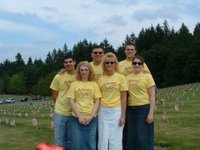Luke 14:23 KJV
And the lord said unto the servant, Go out into the highways and hedges, and compel them to come in, that my house may be filled.
I wonder what God thinks of church houses that are not filled with people ready and willing to hear His blessed Word?
The parable makes it clear that God's desire is to see His house full. On first look one might think that refers to heaven, and if that is the case then we have a little bit of an out.
First, we do not know how full or empty heaven will be. We don't take a survey that we can see with our eyes. We don't have any physical evidence one way or the other how many are saved through the ages.
Second, ours is only a small part of the equation as to how many actually might be there. We can spread the blame on others, in lands where there are fewer missionaries, in cultures where very few get saved, in places where someone else is responsible, maybe they have dropped the ball.
But it is also true that the house of God is a reference to the local church and in that case we are confronted week after week with the fact that our God is not pleased to see empty seats in His house whenever the Word of God is fed.
The parable lays some of God's displeasure on the shoulders of those who refuse to come in. But it lays all of the responsibility to fill the seats upon we who are His servants. We are to "compel them to come in." We are to do whatever it must and we are to go wherever we must to find somebody who will take that empty chair.
God does not give ever house the same number of chairs, but God does expect that what chairs we have will be filled.
And the lord said unto the servant, Go out into the highways and hedges, and compel them to come in, that my house may be filled.
I wonder what God thinks of church houses that are not filled with people ready and willing to hear His blessed Word?
The parable makes it clear that God's desire is to see His house full. On first look one might think that refers to heaven, and if that is the case then we have a little bit of an out.
First, we do not know how full or empty heaven will be. We don't take a survey that we can see with our eyes. We don't have any physical evidence one way or the other how many are saved through the ages.
Second, ours is only a small part of the equation as to how many actually might be there. We can spread the blame on others, in lands where there are fewer missionaries, in cultures where very few get saved, in places where someone else is responsible, maybe they have dropped the ball.
But it is also true that the house of God is a reference to the local church and in that case we are confronted week after week with the fact that our God is not pleased to see empty seats in His house whenever the Word of God is fed.
The parable lays some of God's displeasure on the shoulders of those who refuse to come in. But it lays all of the responsibility to fill the seats upon we who are His servants. We are to "compel them to come in." We are to do whatever it must and we are to go wherever we must to find somebody who will take that empty chair.
God does not give ever house the same number of chairs, but God does expect that what chairs we have will be filled.











